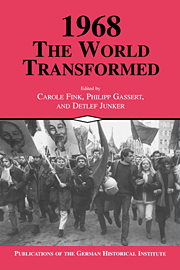Book contents
- Frontmatter
- Introduction
- Part One Tet and Prague: The Bipolar System in Crisis
- Part Two From Chicago to Beijing: Challenges to the Domestic Order
- 7 1968 and the Unraveling of Liberal America
- 8 March 1968 in Poland
- 9 May 1968 in France
- 10 A Laboratory of Postindustrial Society: Reassessing the 1960s in Germany
- 11 The Third World in 1968
- Part Three “Ask the Impossible!”: Protest Movements of 1968
- Epilogue
- Index
7 - 1968 and the Unraveling of Liberal America
Published online by Cambridge University Press: 05 January 2013
- Frontmatter
- Introduction
- Part One Tet and Prague: The Bipolar System in Crisis
- Part Two From Chicago to Beijing: Challenges to the Domestic Order
- 7 1968 and the Unraveling of Liberal America
- 8 March 1968 in Poland
- 9 May 1968 in France
- 10 A Laboratory of Postindustrial Society: Reassessing the 1960s in Germany
- 11 The Third World in 1968
- Part Three “Ask the Impossible!”: Protest Movements of 1968
- Epilogue
- Index
Summary
For more than twenty years after the end of World War II, a distinctive form of liberalism dominated American politics and much of American intellectual and cultural life. This liberalism had emerged out of the New Deal, but it bore only a partial resemblance to the rich, eclectic ideological world of the 1930s. Postwar liberalism was not concerned, as the New Deal had at times been, with the structure of economic power, the distribution of wealth, or the problem of monopoly. It was a consumerist liberalism, committed to “full employment” and high levels of purchasing power. It was a compensatory liberalism, designed to compensate for, not to remedy, the flaws of capitalism. Its tools were Keynesian fiscal policy, an expanded welfare state, and (by the 1960s) a vigorous effort by both the courts and the federal government to expand and protect the rights of individuals and groups. It did less to challenge than it did to confirm the character of modern industrial society.
So powerful was this new regime, so ineffective the challenges to it, that many postwar liberals came to believe that it had established itself as the principal, even the only, important political tradition in American life. There had arrived, the historian Eric Goldman wrote in 1956, “a broad consensus in the thinking of Americans about the basic public issues of the day.” The arrival of that consensus, he argued, “may well be considered one of the most important facts in all the American story.”
- Type
- Chapter
- Information
- 1968: The World Transformed , pp. 219 - 236Publisher: Cambridge University PressPrint publication year: 1998



